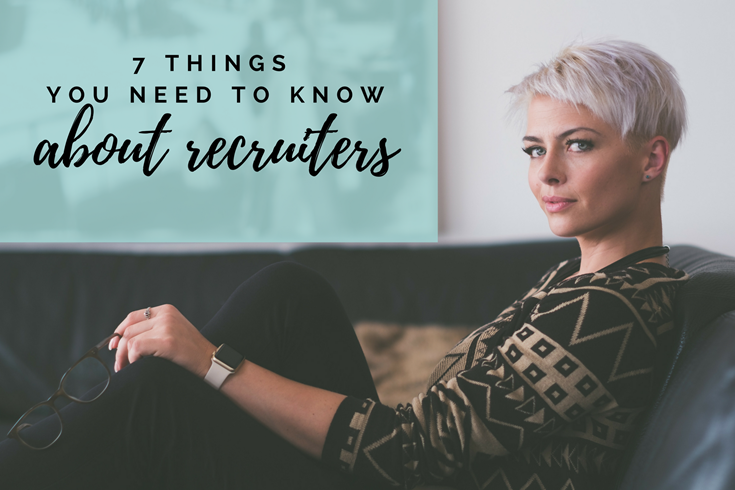|
|
Attention job seekers: it’s important to KNOW YOUR AUDIENCE!
This is true for anyone (i.e. an artist, a freelancer, etc.). And it’s also true for those hoping to land the job of their dreams.
But one of the biggest mistakes I see job seekers make is not putting themselves in the recruiter’s shoes.
Below I want to teach you what you need to know about recruiters. I want to help you get in their minds so you can succeed in your next interview.
Disclaimer: the following does not apply to all recruiters.
Let’s jump right in!
1. Recruiters are not looking for reasons to keep your resume. They’re looking for reasons to throw out your resume.
I always share this whenever I do a resume workshop. I also speak to this in my video guide Resumes That Get You the Interview: Surprising Secrets to Getting Your Resume Noticed. Recruiters will make decisions about your resume based on some of the most nit-picky things.
For example, they might throw your resume out if your bullets from one section of your resume aren’t lined up with the bullets in another section of your resume. This may be especially true if you’re applying for a job that requires you to be detail-oriented. The inconsistency reveals you’re actually NOT detail-oriented.
Other inconsistencies such as not having all your headings in the same font size and format give them a reason to throw out your resume. And of course, so do misspellings and grammatical errors.
Why do recruiters do this? With the volume of resumes received for each job, recruiters have to narrow down their options to something more manageable given all their additional job responsibilities.
How to respond:
Do everything you can to ensure your resume is the best it can be. This means leaving off the things you shouldn’t include and emphasizing the things you should.
To learn more, check out my video guide Resumes That Get You the Interview: Surprising Secrets to Getting Your Resume Noticed.
2. Sometimes recruiters will make decisions regarding your resume just based on your contact info.
As a result of the above, it’s quicker for a recruiter to just look at your contact info at the top of your resume and make a quick decision.
If your address shows you’re out-of-state, they’ll assume you’ll need relocation expenses covered. And the company may want to try to avoid that added expense if at all possible. So your resume gets tossed.
If you’re address indicates you’re local, this too can sometimes be a liability. For instance, if the recruiter recognizes your street name as part of a more well to-do area of town, the assumption could be the company won’t be able to afford your salary requirements.
How to respond:
It’s no longer required or necessary to have your address on your resume as long as you have your phone number and an email address (one with a professional-sounding handle!).
If you still want to put your mailing address on your resume, I suggest moving your contact info to the bottom of your resume.
3. Recruiters are no longer as concerned with what looks like “job hopping” on your resume as they once were.
Or at least they shouldn’t be.
But old habits are hard to break, so I’m sure there are some recruiters who still frown upon job hopping.
However, recruiters are now told they need to be more flexible when considering job hopping.
Why? There are a couple of valid reasons.
One, after the economy tanked in 2008, many people who lost their jobs took whatever jobs they could get at the time to survive. As soon as they were able to find better work, they left what they considered to be temporary work. This created some short-term job situations that were not always within the candidate’s control.
Two, most millennials who are now a vibrant part of the workforce don’t typically stay with a job they view as “dead-end” for very long (whether for good or bad).
One recruiter recently told me the average millennial will leave their job within 8-12 months if they’re not happy. (Brett Cenkus might be onto the reason why in his article “Millennials Will Work Hard, Just Not for Your Crappy Job“.)
How to respond:
Relax if you’re concerned about being seen as a job-hopper. It’s not going to be as big of a deal as you think.
And remember, you don’t have to include every job you’ve ever had on your resume. You can just include the ones that are relevant to the position under a heading called “Relevant Experience”
4. Recruiters can be just as nervous in the interview as you are.
I discussed this in my previous post when I gave a critique of the real interviews featured on CNBC’s old show, The Job Interview.
Recruiters are nervous because they know you’re also nervous. They’re nervous for you because they want you to do a good job. They’re rooting for you.
And they’re nervous they’ll make a costly mistake and hire the wrong person. They’re job performance could be dependent upon their hiring decision.
How to respond:
Acknowledge that recruiters can also be nervous. Doing so will help calm your own nerves too.
Approach the interview in a way that assures them you can do the job and solve the problem they need the candidate to solve in the job. You can do this by providing specific examples of how you’ve solved similar problems in the past.
I teach you the method for doing this in my video guides Steps to Acing the Interview and Reducing Your Interview Anxiety and The 3 Super Powers of Successful Job Seekers: Stand Out Above Your Competition.
5. Recruiters don’t see your over-qualifications as an asset. Instead, they see them as a liability.
Don’t assume that if the job only requires a bachelor’s degree your MBA will give you the competitive edge.
And if they’re seeking someone with 10 years of experience and you have 15, that’s not going to give you a competitive edge either.
Instead, both of the above will often be viewed by the recruiter as liabilities. They’ll assume they won’t be able to afford you and will move on to the next applicant.
How to respond:
If the job you really want doesn’t either require or prefer an advanced degree, leave it off your resume. Just like you don’t have to include every job you’ve ever had on your resume, you also don’t have to include every degree or certification.
If you have a few more years of experience than what’s required, just say you have, for example, 10+ years for a 10-year experience requirement.
Neither of these responses is considered lying. The goal is to get your resume through the resume filtering software and to secure the job interview. Once you do that, then you can further explain why you’re interested in the job and why you’re willing to work at a lower level to achieve your career goals.
6. Recruiters will assume you’re not interested in the job or the company if you don’t ask them any questions during the interview.
I’ve said this time and time again, but it’s always worth repeating.
You MUST have questions of your own prepared in an interview. This is necessary for two main reasons:
- You have to show you’re genuinely interested in the job. Not asking questions shows you couldn’t care less about it. The offer will usually go to the qualified person who’s most enthusiastic about the company and the position.
- You have to get the answers you need to determine if the job is a good fit for you. Remember interviewing is a two way street!
How to respond:
You can actually WIN the interview by asking the right kind of questions instead of the same old ones other candidates ask. Click here to know what questions you should ask to secure the job offer.
7. Recruiters do use LinkedIn to find candidates.
People often ask me, do people really find jobs on LinkedIn? The answer is yes. And recruiters often find YOU on LinkedIn because they’re using it daily to search for qualified candidates.
Therefore, the real question is, do you show up in the recruiters’ searches for the type of job you want?
If you’re like most people and all you’ve ever done on LinkedIn is create a profile with limited info and did nothing else with it, your answer is probably no.
How to respond:
You need to fill out your profile in full and make it keyword-rich. Use every field as a potential place to include the keywords you think the recruiter will be searching. (Here’s a hint: you’ll find those keywords in the job ads of your preferred job.)
But there are other things you can do with LinkedIn to increase your chances of being seen by the right recruiters and finding the job you want. Too many things to cover in this post.
I typically spend a good hour to an hour and a half one-on-one with my clients showing them all they can do with the LinkedIn platform. They’re usually amazed at what all they can do with it.
If interested in learning more about how to use LinkedIn, click here to fill out my intake form.
Related Posts:
- What NOT to Do In a Job Interview: 16 Mistakes That Will Make You Look Unprofessional
- Career Advice No One Will Ever Share With You
- The One Surprising Tip That Guarantees a Good Interview
- Modern Interview Advice to Make You Stand Out From the Competition
- The Best Way to Answer Behavioral Interview Questions
Receive a complimentary copy of the 8-Step Goal-Achievement Plan when you subscribe to the paNASH newsletter.






